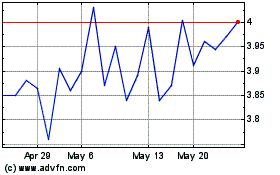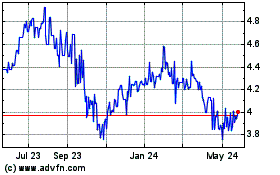Airbus Group SE's A380 superjumbo program hit fresh turbulence
after Singapore Airlines Ltd.—the aircraft's first buyer and
currently its second-largest customer—said it won't renew the lease
for its first plane.
The lease on the A380 expires in October next year and "we have
decided not to extend it," Singapore Airlines told The Wall Street
Journal on Wednesday.
The decision isn't a fateful blow for the program, Airbus's
biggest and costliest jet. But it is another symbolic hit for the
double-deck aircraft, for which Airbus has struggled to find
customers after investing about $15 billion to develop.
Airbus in July announced it would slash production of the A380
to 12 planes a year in 2018 from 27 last year. The backlog of A380s
to be delivered has eroded during years of no or few orders.
The A380's size has become its disadvantage as airlines prefer
relatively smaller planes such as the Airbus A350 and rival Boeing
Co.'s 787 Dreamliner that can fly nonstop to their ultimate
destinations, bypassing major hubs such as London Heathrow and
Singapore's Changi Airport. The demand for point-to-point
connectivity has grown faster than the traffic at major hub
airports in recent years.
Airbus will again start losing money building A380 planes at the
lower production rate, the plane maker based in Toulouse, France,
has said. Last year was the first in which Airbus didn't lose money
on the A380 program since it embarked on developing the superjumbo
jet in 2000.
The Singapore flag carrier currently operates 19 of the jets.
The first five were taken on a 10-year lease deal with Airbus.
"Decisions will be made on the four others later," a Singapore
Airlines spokesman said.
Brendan Sobie, an analyst at CAPA Center for Aviation, expects
Singapore Airlines to return all five of the early A380 jets in its
fleet. "Their fleet plan and strategy has always been to replace
those aircraft. Early model airplanes come with limitations and
Singapore Airlines never wanted to be stuck with remarketing these
five airplanes," Mr. Sobie said.
Initial-production jets are generally less popular with airlines
as they are heavier and often come with teething problems as
manufacturers work out kinks. But Singapore Airlines' decision to
give up its lease will put at least one secondhand plane on the
market, potentially weakening already softened demand for new
A380s.
Singapore Airlines isn't the only airline turning its back on
some of its A380 jets. Malaysia Airlines has decided to replace its
A380 jets with the smaller A350 jets and is looking for customers
to buy or lease its six jets, the airline's chief Peter Bellew told
The Wall Street Journal in a recent interview.
Air France-KLM SA this year said it had dropped plans to take
the last two A380s it had ordered.
Other airlines have pulled the plug even earlier. Airbus this
year announced that French carrier Air Austral had canceled an
order for two A380s, the latest in a raft of voided purchases of
the plane. Previously, the India-based Kingfisher Airlines Ltd.,
founded by Vijay Mallya, ordered the plane before the carrier
controversially folded in 2012. Russia's No. 2 carrier Transero
also was a buyer before it closed last year. Japan's Skymark
Airlines Inc. had ordered the A380 before the contract was voided
over payment issues.
There are also doubts about some A380s in the Airbus order
backlog. Virgin Atlantic Airways Ltd., the British airline founded
by Richard Branson, has ordered six of the planes but has no plans
to introduce them into service. The carrier this year also
announced plans to buy Airbus's A350-1000 long-haul plane, a more
modern, twin-engine widebody. Ireland-based lessor Amedeo has
ordered 20 of the planes but so far failed to place them with
airline customers.
The Singapore Airlines A380s are owned by German leasing company
Doric GmbH, which will need to find a customer for the returning
plane in the next 12 months. The leasing firm had no immediate
comment.
Airbus wouldn't comment on the Singapore Airlines decision,
saying it doesn't discuss individual airline fleet plans.
"We are confident in the market for secondhand A380s, which can
be leased or acquired at attractive rates. This will offer a great
opportunity for new entrants with new business models to start
operating the A380," a company spokesman said by email.
Fabrice Bré gier, who oversees Airbus's commercial
plane-building unit, has said finding more A380 customers was a
priority. The availability of used superjumbo jets could allow new
operators to get a taste for the plane with a lower financial
commitment than buying a brand-new A380, he has said.
Despite years of trying, Airbus has struggled to win new orders
for the A380, which costs $432.6 million each at list price.
Airlines have shied away from the superjumbo jet that can seat more
than 600 people, worried about how to fill all its seats.
International Consolidated Airlines Group SA chief executive
Willie Walsh this year said he would consider taking some used
A380s to augment the 12 now in service with British Airways. Mr.
Walsh has said taking secondhand planes would make more sense than
exercising more expensive options for new A380s.
The biggest success for the A380 is Emirates Airline, by far the
largest customer. The Dubai-based carrier, the world's largest by
international traffic, operates a fleet of more than 80 of the
four-engine planes and has placed orders for 142 of the jets.
The A380 program received a rare boost when Japan's All Nippon
Airways Co. in December ordered three of the planes. Iran Air also
has announced plans to take 12 of the Airbus flagship plane as part
of a $27 billion deal with the European plane maker. The deal
remains to be completed, absent U.S. export approvals and
financing.
Write to Gaurav Raghuvanshi at gaurav.raghuvanshi@wsj.com and
Robert Wall at robert.wall@wsj.com
(END) Dow Jones Newswires
September 14, 2016 09:45 ET (13:45 GMT)
Copyright (c) 2016 Dow Jones & Company, Inc.
ANA (PK) (USOTC:ALNPY)
Historical Stock Chart
From Oct 2024 to Nov 2024

ANA (PK) (USOTC:ALNPY)
Historical Stock Chart
From Nov 2023 to Nov 2024
